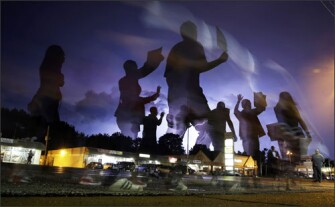
Only a half-hour drive and the Illinois state line separate the Edwardsville school district from Ferguson, Mo., but teachers there are no longer talking about the events going in the city next door.
Ferguson itself has delayed the beginning of its school year due to the protests stemming from a white police officer killing a young, unarmed black teenager named Michael Brown on Aug. 9. The protests have ignited a media frenzy and sparked debates about race and justice. For Edwardsville, located just across the Mississippi river, the protests might seem like a natural fit for class discussion.
Except that the superintendent has banned teachers from talking about them with students.
The year didn’t start out that way. When Edwardsville classes resumed, according to the St. Louis Post-Dispatch, Ferguson was naturally the hot topic. But parents complained to district superintendent Ed Hightower that some teachers were interjecting their own opinions into class discussions rather than objectively guiding discussion for students:
'We engage,' he said. 'We encourage discussion of current events. But you have to be careful injecting personal opinion when you don't have the facts.'
Indeed, details of what happened that night in Ferguson continue to come in. But neither students nor all parents seem on board with the district’s policy of quashing discussion altogether.
“It’s modern history,” Abigail Wilson, an Edwardsville senior, told the Dispatch. “It’s huge. It’s so much more interesting than things that happened 200 years ago.”
“An event of this magnitude shouldn’t be swept under the rug,” parent Glenn Beckmann said. “We have hundreds of teachers in the school district and I would bet 98 percent would discuss this with students objectively.”
Meanwhile, a number of teachers around the country have been making the case that it is incumbent on educators, for both moral and educational reasons, to address the issue in classrooms. Veteran California English teacher David B. Cohen, for example, argues that such discussions can make for powerful moments of connection with students:
If we place the [scheduled] lesson plan ahead of significant moments in our communal life, we not only rob students of a chance to learn something more lasting and potentially important, but we also unwittingly reinforce the oft-heard but incorrect message that school is separate from 'the real world.'
How Do You Talk About Controversial Subjects With Students?
The story in Edwardsville plays on a broad public expectation that teachers should try to develop students’ critical thinking skills rather than influence their opinions. But that can be a tricky balance.
Back in February, you might recall a public debate over evolution between scientist Bill Nye and Creation Museum founder Ken Hamm. When it happened, I asked EdWeek Teacher readers how they would respond if a student asked them about creationism. Some respondents split between offering their own opinion and guiding students to figure it out their own.
@EdWeekTeacher @educationweek Yes it’s true. When they ask for your personal opinion, you give it!
-- Mike (@mikerayjohnson) February 6, 2014
@educationweek @EdWeekTeacher A: “What I believe is irrelevant. What you can prove is extremely relevant. U tell me: is it true,& prove it.”
-- Matt Drewette-Card (@DrewetteCard) February 7, 2014
Maybe this is an area where districts need to establish more clearly defined policies, if they don’t already? Or perhaps it’s an opportunity for teachers to learn from each other about how they can teach controversial events. Feel free to leave your own suggestions in the comments.
See additional coverage of Ferguson from Education Week:
- Schools in Ferguson, Mo., Suspend Black Students at Higher Rates Than Their Peers
- Teacher Raises Over $100,000 to Feed Ferguson Students
- Ferguson Schools Closed Through Friday as Unrest Continues in the City
Image: In this photo taken with a long exposure, protesters march in the street as lightning flashes in the distance in Ferguson, Mo., on Wednesday. Protesters rallied after a police officer shot unarmed Michael Brown on Aug. 9 in the St. Louis suburb. Credit: Jeff Roberson/AP